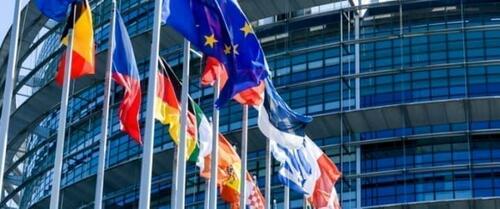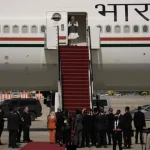
Authored by Tsvetana Paraskova via OilPrice.com,
-
After months of negotiations, the EU finally agreed in December to set a price cap on natural gas.
-
European Securities and Markets Authority: The gas price cap could trigger significant and abrupt changes of the broader market environment, which may impact the orderly functioning of markets.
-
If risks to the security of supply occur, the European Commission will suspend the price cap rule.
The upcoming price cap on the benchmark European gas contract could abruptly change the gas market and impact the functioning of other markets as well as financial stability, according to the European Securities and Markets Authority (ESMA).
ESMA was expected to announce on Monday the assessment of the consequences of the gas price cap on the markets.
“It could trigger significant and abrupt changes of the broader market environment, which could impact the orderly functioning of markets, and ultimately financial stability,” ESMA was expected to say, according to the opinion seen by Bloomberg ahead of its publication.
After months of negotiations, the EU finally agreed in December to set a price cap on natural gas to protect consumers from excessive price spikes and limit inflationary pressure and industrial damage to European economies.
EU energy ministers reached a political agreement on a regulation that sets a so-called “market correction mechanism,” which would come into force on February 15, 2023.
The market correction mechanism will be triggered if the month-ahead price on the Title Transfer Facility (TTF), Europe’s key benchmark, exceeds $196 (180 euros) per MWh for three working days, and the month-ahead TTF price is $38 (35 euros) higher than a reference price for LNG on global markets for the same three working days.
However, if risks to the security of supply occur, the European Commission will suspend the price cap rule, the EU agreed last month.
“The Commission stands ready to suspend ex ante the activation of the mechanism, if an analysis from ECB, ESMA and ACER shows that the risks outweigh the benefits,” EU Energy Commissioner Kadri Simson said.
Some effects could be seen only after the activation of the gas price cap, and it’s difficult to predict, ESMA says in today’s opinion, according to the draft Bloomberg has seen.
“It is entirely possible that some of the potential effects in the trading and clearing environment might only unfold” after the price cap activation.
Market liquidity could be reduced, says the EU authority, although significant effects could not be identified so far.
In the first assessment on the EU gas price cap rule and the positions limit on the futures contracts in December, ESMA said that “Overall, the position limits set for the spot month and the other months appear to achieve a reasonable balance between the need to prevent market abuse and to ensure an orderly market and orderly settlement, while ensuring that the development of commercial activities in the underlying market and the liquidity of the Dutch TTF Gas commodity contracts are not hampered.”
“ESMA however notes that setting position limits in the uncertain geopolitical environment created by the Russian invasion of Ukraine and Russia’s decision to significantly reduce delivery of natural gas to the EU may prove challenging, especially in relation to the calculation of deliverable supply,” the authority said.
“ESMA also notes that the Dutch TTF Gas contracts may be impacted by the measures that may potentially be taken by the Council and the European Commission regarding the operation of the EU energy spot and derivatives markets.”
The European Union Agency for the Cooperation of Energy Regulators (ACER) said last month that the EU’s price cap on natural gas is an untested tool that may not work as intended to prevent gas price spikes for European households and businesses.
The gas price cap is “a difficult creature. It’s unprecedented, it’s untested,” ACER’s director Christian Zinglersen told the Financial Times in December. Zinglersen also noted that he would be “reluctant to rely on this gas price cap” to protect EU consumers from price spikes.
The benchmark EU gas price at the Dutch TTF is currently well below the price level at which the cap would be activated, trading below $76 (70 euros) per MWh on Friday. Prices slumped last week to levels last seen before the Russian invasion of Ukraine due to milder weather at the start of the year, LNG inflows, and still comfortable EU gas storage levels. Yet, analysts say the market is ripe for further volatility in the coming months.
Authored by Tsvetana Paraskova via OilPrice.com,
-
After months of negotiations, the EU finally agreed in December to set a price cap on natural gas.
-
European Securities and Markets Authority: The gas price cap could trigger significant and abrupt changes of the broader market environment, which may impact the orderly functioning of markets.
-
If risks to the security of supply occur, the European Commission will suspend the price cap rule.
The upcoming price cap on the benchmark European gas contract could abruptly change the gas market and impact the functioning of other markets as well as financial stability, according to the European Securities and Markets Authority (ESMA).
ESMA was expected to announce on Monday the assessment of the consequences of the gas price cap on the markets.
“It could trigger significant and abrupt changes of the broader market environment, which could impact the orderly functioning of markets, and ultimately financial stability,” ESMA was expected to say, according to the opinion seen by Bloomberg ahead of its publication.
After months of negotiations, the EU finally agreed in December to set a price cap on natural gas to protect consumers from excessive price spikes and limit inflationary pressure and industrial damage to European economies.
EU energy ministers reached a political agreement on a regulation that sets a so-called “market correction mechanism,” which would come into force on February 15, 2023.
The market correction mechanism will be triggered if the month-ahead price on the Title Transfer Facility (TTF), Europe’s key benchmark, exceeds $196 (180 euros) per MWh for three working days, and the month-ahead TTF price is $38 (35 euros) higher than a reference price for LNG on global markets for the same three working days.
However, if risks to the security of supply occur, the European Commission will suspend the price cap rule, the EU agreed last month.
“The Commission stands ready to suspend ex ante the activation of the mechanism, if an analysis from ECB, ESMA and ACER shows that the risks outweigh the benefits,” EU Energy Commissioner Kadri Simson said.
Some effects could be seen only after the activation of the gas price cap, and it’s difficult to predict, ESMA says in today’s opinion, according to the draft Bloomberg has seen.
“It is entirely possible that some of the potential effects in the trading and clearing environment might only unfold” after the price cap activation.
Market liquidity could be reduced, says the EU authority, although significant effects could not be identified so far.
In the first assessment on the EU gas price cap rule and the positions limit on the futures contracts in December, ESMA said that “Overall, the position limits set for the spot month and the other months appear to achieve a reasonable balance between the need to prevent market abuse and to ensure an orderly market and orderly settlement, while ensuring that the development of commercial activities in the underlying market and the liquidity of the Dutch TTF Gas commodity contracts are not hampered.”
“ESMA however notes that setting position limits in the uncertain geopolitical environment created by the Russian invasion of Ukraine and Russia’s decision to significantly reduce delivery of natural gas to the EU may prove challenging, especially in relation to the calculation of deliverable supply,” the authority said.
“ESMA also notes that the Dutch TTF Gas contracts may be impacted by the measures that may potentially be taken by the Council and the European Commission regarding the operation of the EU energy spot and derivatives markets.”
The European Union Agency for the Cooperation of Energy Regulators (ACER) said last month that the EU’s price cap on natural gas is an untested tool that may not work as intended to prevent gas price spikes for European households and businesses.
The gas price cap is “a difficult creature. It’s unprecedented, it’s untested,” ACER’s director Christian Zinglersen told the Financial Times in December. Zinglersen also noted that he would be “reluctant to rely on this gas price cap” to protect EU consumers from price spikes.
The benchmark EU gas price at the Dutch TTF is currently well below the price level at which the cap would be activated, trading below $76 (70 euros) per MWh on Friday. Prices slumped last week to levels last seen before the Russian invasion of Ukraine due to milder weather at the start of the year, LNG inflows, and still comfortable EU gas storage levels. Yet, analysts say the market is ripe for further volatility in the coming months.
Loading…







